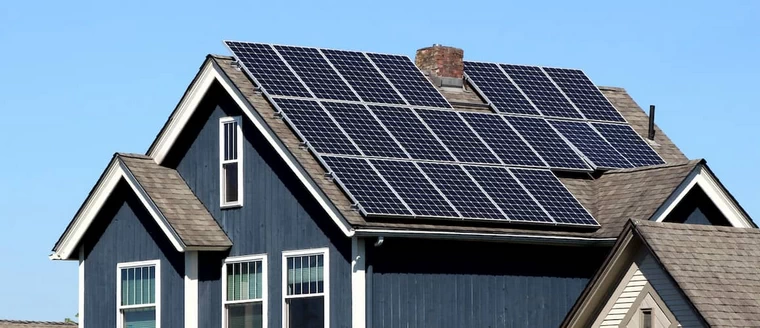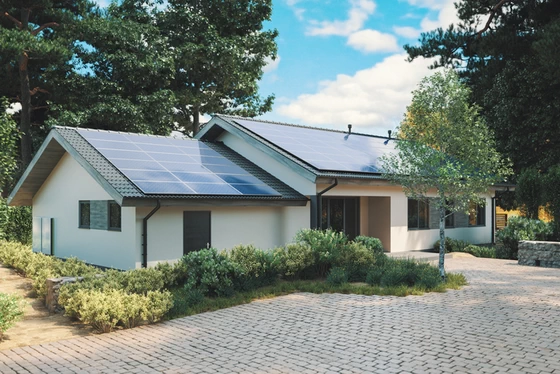Page Contents
- How Much Will Solar Panels Add Value To Your Home?

How Much Will Solar Panels Add Value To Your Home?
You’re probably here because looking to know how much your home is worth when solar panels are fitted to it.
We conducted research into the value of homes with improvements in energy efficiency, such as home solar panels. We discovered a variety of sources of information that are reliable about the subject and have compiled the information in this article. It is possible that you are interested in what you can do to get the approximate value of the value increase for your home We’ve created an easy-to-follow guide as well.
This article will go over studies on solar and home sales from across the country as well as examples of home valuation calculations and look at factors that affect the value of solar-powered homes the most.
Solar panels boost the value of a property
Let’s begin by imagining an experiment. Imagine you’re thinking of buying either of the two houses located across exactly the same road. The only difference between them is the fact that one is equipped with enough solar panels on its rooftop installed to get rid of a $200 per month power bill. The other one has an empty roof.
That’s $2,400 per year in savings when you purchase the solar house instead of the next. You’ll not only save enormously on electricity costs every year, but you’re also decreasing the carbon footprint of your home and keeping out the negative impact of future increases in utility rates through the production of your own electricity.
It is logical that the value of a solar-powered home will be much higher than homes without solar panels. However, the issue is how much? The precise answer is contingent on a number of factors that we’ll cover in the next section, but we’ll go over three studies to help guide us to a range that you feel comfortable with in the first place.
Research has shown that solar energy is linked to the value of properties
The Appraisal Journal The Appraisal Journal authors Ruth Johnson and David Kaserman reported, “Home value increases of around $20 per dollar savings on energy bills”. In the instance of the savings of $200 per month example, you can imagine the value of the solar house to be 48,000 greater than it did before ($200 twelve months + 20= $48,000).
To give a second instance, a study conducted by the Lawrence Berkeley National Laboratory yields the formula for a $5k value of resale increase for every Kilowatt (kW) in solar power installed. To achieve a similar increase in home value of $48,000 in the Appraiser’s Journal using this formula, you’ll need a 9.6kW system (9.6 + $5,000 equals $48,000).
At an average cost of $3500 for a kW of installation upfront and you can have the same size system installed for just $33,600. The difference in value in relation to the investment gives you an opportunity to arbitrage that is $1,500 for each kW of solar power installed. This doesn’t even take into account the federal tax credit for investment that allows you to recuperate 26 percent of the price of your solar home installation. In certain states, the value of your home increases and is exempt from any additional property taxes.
If you’re planning to sell your house faster and at a lower cost then it’s beneficial to first install solar! You can anticipate a rapid return on investment with this type of renewable energy home enhancement.
Another study from the National Bureau of Economic Research found that homebuyers pay an average of 4% more for homes with solar power systems than homes with no solar. While this estimate may seem simple, however, there are many unknown factors. For instance, the estimate doesn’t take into account the dimensions of solar panels.
If you put a tiny solar array on your house it’s not enough to use this formula to make the calculations and tell your agent who is selling your house, “Hey, the National Bureau of Economic Research stated that my house is worth 4 percent more, therefore, let’s sell it at this price instead”. To achieve the increase of $48,000 that was mentioned in this example of 4 you’ll need an investment of $1.2M. Most homes aren’t worth that amount outside California and many homeowners don’t require a 10-kW solar array to pay their electric bills.
Estimating a ballpark for an increase in the value of your home
Based on the calculations above, the solar panel’s power is at 6kW. This is the best option for electric bills of $120 per month.
- It is possible to estimate quickly a $30,000 value boost for your home based on an increase of $30,000 using the Lawrence Berkeley Labs formula (6kW multiplied by $5,000).
- According to the Appraisal Journal article 120 dollars of utility, savings amounts to $1,440 per year. Multiply that number by 20 and you’ll get an anticipated market value growth of $28,800
- In the end, taking Zillow as well as a National Bureau of Economic Research study, you can determine that you’ve got the Zestimate which is $550,000 for your home. An increase of 4% in value for your home would amount to approximately $22,000.
This way the ballpark estimate for a 6kW system would range from a $22,000-$30,000 increase in the value of your home.

There are several aspects that influence the cost of your house sale such as the time the PV unit is as well as the area you live in.
The PV system is getting old
If you had your solar energy system in the year 1995 it is unlikely to gain the same home worth as a photovoltaic panel that was installed by 2022. Solar modules are way more efficient than they used to be, and as such, are more valuable the newer they are. The calculations above assume that the solar panels have at the very least 20 years of lifespan left. For the formula used by the Appraiser’s Journal, this is why they chose the multiplier of 20.
Your location
Solar panels can last for a period between 25 and 35 years and, depending on where you live, they could be cost-saving and income-generating assets. The cost of utilities varies widely in various regions, and so do other solar policies including exemptions from property taxes for solar properties. Below are the most important geographical variations in the value of homes through solar power.
Solar incentives that are based on performance
Certain states offer incentives for solar performance based on performance. They will pay you for renewable power that you generate over time. If you’re lucky enough to reside within one of the states like Massachusetts and New Jersey, your solar panel at home is worth much more.
Costs for electricity
Certain regions of the country are more expensive utility bills than other areas. Solar power is worth more in places such as New York and Hawaii due to the fact that they are more effective in terms of compensating for higher utility costs.
Solar system ownership status
If a house has solar panels installed but the owner isn’t the owner of the system as a result of a leasing agreement for solar the value of the home won’t be much more. This is because the panels aren’t part of the property. Someone other than the owner of the panels! Although savings on electricity bills are present at any time, the leasing company is able to take their panels down if they would like to.
A new customer would not be eligible for local solar incentives such as renewable energy certificates since they were returned at the expense of the leasing firm following the installation of the system.
Solar record keeping for home sales
When the time comes to sell your solar-powered home, it’s recommended to have your records ready for potential buyers to look over. It is important to prove that your solar installation was carried out by an accredited installer and was properly approved.
It is also important to keep track of your system’s warranty details and, in the ideal case, electricity bills that include before and after evidence of the savings on energy. Store these documents in a safe location and collaborate with your realtor to ensure they’re properly and clearly communicated at the time of sale.
This will allow you to preserve the most value for your home.
Final thoughts
If you’re thinking about installing solar, and you’re also considering moving within the near future take it on.
You’ll not only be able to save cash on your electric bills in the short run, but when it comes time to sell your house, you can anticipate your solar panel for your home’s installation costs to be higher than the amount you pay back in full. Also, you can expect that your home will sell faster.
Solar is a smart, stylish investment. When you’re looking for a new home is there any reason why potential buyers shouldn’t prefer a more efficient house?
Related Solar News
- Integrating Renewable Energy with IoT ( 2024)
- Guide to Solar Panels in North Carolina (2024)
- The Role of Battery Storage in Maximizing Solar Power Potential ( 2024)
- Hydrogen Fuel Cells vs. Solar Panels (2024)





